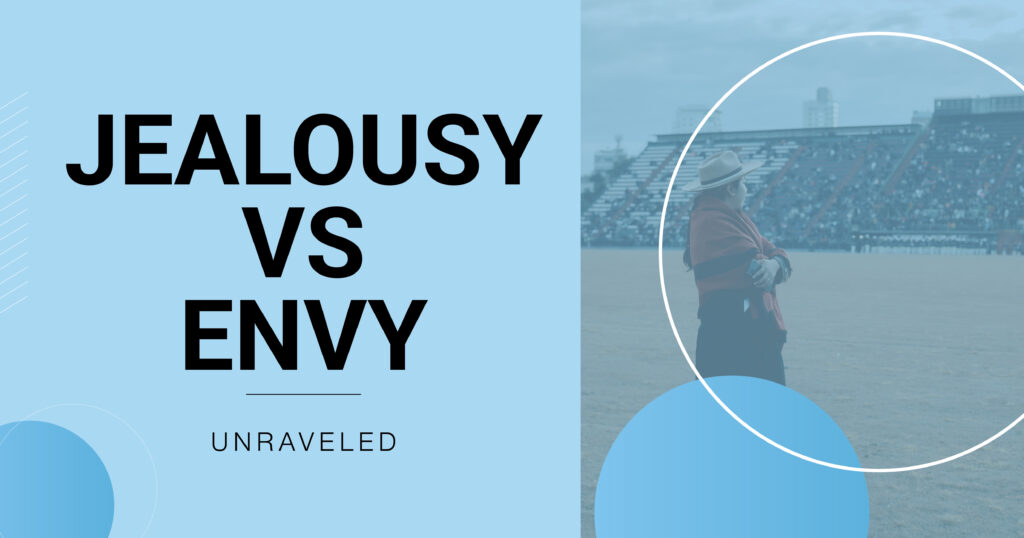The feeling quietly enters when you are having a basic conversation with someone. Other times, you’re alone, replaying the moment. When someone discusses their new position or their fresh beginning or deep relationship with others, you pretend to be pleased, but your inner world begins to tighten. There’s no anger. No sadness. Just a tightness you can’t ignore.
But hear this: it isn’t nothing. It’s a signal. A signal that this emotion belongs to one of two families: jealousy vs envy meaning. If you never learned to recognize these emotions separately, the energy might turn inward to become feelings of guilt or blame. Understanding the jealousy definition and envy definition gives clarity when these emotional signals begin to surface.
This isn’t a personal diagnosis. Letting your feelings express themselves clearly enables you to respond with insight rather than becoming confused. That insight is essential when you’re focused on dealing with envy in everyday interactions.
Defining Jealousy and Envy
People commonly confuse jealousy and envy yet these two emotions stem from different origins which carry significant importance in understanding them.
| Emotion | What Triggers It | Core Feeling |
| Jealousy | Perceived threat to what you value | Protective, uneasy, reactive |
| Envy | Desire for what someone else has | Longing, inadequacy, frustration |
One protects what belongs to you right now. The other stings because you don’t have something you want. The feelings aren’t flaws because they function as indicators to reveal what truly matters to you although you may not have expressed it.
Recognizing the Signs of Jealousy
Jealousy doesn’t always stomp through the door. At times the emotion enters quietly while pretending to be happy. This emotion conceals itself through brief answers as well as sarcastic inside jokes and a quiet queasy feeling when your dear ones share laughter with others.
You might find yourself:
- Feeling tense when someone you care about gives attention to someone else
- Overanalyzing texts, conversations, or social media interactions
- Making passive comments that sound like jokes but land with a sting
- Wanting to be included in every plan, even if it feels forced
- Feeling irritable without a clear reason when your space feels “shared”
The issue does not stem from being demanding or over-the-top. Your thoughts create a protective barrier to safeguard something important. The absence of awareness about your emotions causes them to manifest indirectly through destructive behavior mainly toward the people who matter most. The point isn’t to suppress it. It’s to spot it before it runs the show.
Identifying the Signs of Envy
You hear someone deliver positive news but your body constricts without a clear reason. It’s not anger. Not sadness either. You don’t even know why it hits you that way. Perhaps the situation triggered this reaction because it brought back memories of your unmet desires.
Here’s how it can look:
- Feeling stuck or discouraged after seeing someone else succeed
- Downplaying someone else’s win to make yourself feel better
- Criticizing someone, not out loud, but in your head, to soften the sting
- Avoiding conversations or celebrations that remind you of what you don’t have
- Questioning your own worth or progress in private moments
Envy presents a challenge because it disguises itself as drive yet eats away at your feeling of completeness. The unchecked emotion evolves into resentment because it strikes an unaddressed vulnerability within you.
Understanding your emotions does not indicate that you are shallow or resentful. It means you’re honest. Through honesty, genuine progress becomes possible.
Jealousy in Relationships and Its Impact
Jealousy in relationships doesn’t always look dramatic. The emotion manifests as slight unease, doubts about your partner’s voice, and their text messages. The underlying affection transforms into relationship problems because of unaddressed feelings. Sometimes, it’s not about the other person at all, but a mirror reflecting your own insecurities.

The issue transcends insecurity because it represents a deep-seated fear. You fear that someone else will take your place. The fear of not meeting expectations. The fear of losing something that holds greater value than you can express. These are subtle but powerful signs of jealousy, often mistaken for love or concern. Acknowledging them is the first step in overcoming jealousy without letting it sabotage the connection.
| Trigger | Reaction |
| Your partner spends time with someone else | You feel distant, shut down, or overly curious |
| They don’t respond right away | Your mind creates worst-case scenarios |
| You compare your relationship to others | You start feeling like your connection is lacking |
Envy in Friendships: Challenges and Solutions
Signs of envy do not indicate a broken relationship, but they do highlight internal conflicts. You need reassurance because an inner voice within you is requesting it. You need to give this voice expression because otherwise it will act as a barrier that pushes you apart instead of helping you get closer. When this happens in platonic settings, it’s often envy in friendships, showing up as comparison or quiet resentment.
The answer to validation needs is not continuous validation because it requires simple communication. Your ability to express feelings along with their reasons proves connection instead of control. That skill becomes especially powerful when dealing with envy in a way that nurtures rather than isolates.
You might notice it when:
- Your friend lands a job you’ve been gunning for
- They seem to have more time, money, or luck
- Their relationship seems to be thriving while yours is falling apart
- They’re getting attention for something you’ve quietly worked toward
You begin to feel either invisible or that they have taken over the life you desired, instead of experiencing genuine happiness for them.
That doesn’t make you a bad friend. It makes you human. Ignoring envy in friendships creates a silent destruction of the relationship.
Here’s what helps:
- Pause before you compare. Social media only shows the highlight reel.
- Be honest with yourself first. What’s really being triggered here?
- Talk about it when it’s safe to do so. A real friend won’t run from your honesty.
- Celebrate them anyway. It doesn’t make your goals less valid.
Surviving envy in friendships occurs because the feelings naturally appear, but both friends maintain open communication about them.
Strategies for Overcoming Jealousy
Here’s what actually helps:
- Name the feeling, don’t shame it. Jealousy has a way of disguising itself. But once you call it what it is, it loses some of its grip.
- Ask yourself what feels threatened. Is it your relationship? Your sense of worth? Your place in someone’s life?
- Check your stories. Just because something feels true doesn’t mean it is. Not every silence means rejection. Not every pause means loss.
- Talk with – not at – the person involved. Start from curiosity, not accusation. “I’ve been feeling a little off lately, and I think I need to talk about it,” lands differently than “Why didn’t you tell me?”
- Work on your inner security. The more solid you feel in yourself, the less likely jealousy is to shake you.
The path to personal development requires tolerating unpleasant experiences. The process of understanding what you learn from it happens after you sit through it for an extended time. Your jealousy serves as a warning sign about important matters in your life.
Effective Ways of Dealing with Envy
Envy can creep in quietly. As you scroll through content and listen to music while smiling, you experience a sudden feeling that another person possesses what you desire but you remain watching from the outside. It’s not about wanting them to lose. It’s about wondering why you haven’t won.
How can you handle these situations so they do not turn you into a hardened person?
| Tactic | Why It Works |
| Acknowledge it without guilt | Admitting you’re envious doesn’t make you ungrateful. It just makes you honest. |
| Get specific about the trigger | The clearer you are, the less power it holds. |
| Use it as information, not ammo | Let envy show you what you want, not who you should resent. |
| Reclaim your focus | Turn comparison into clarity. Where do you want to go, and what’s one step you can take now? |
The bitter quality of envy is not inevitable for everyone. It will lead to better results when you actively listen to the real message it brings.
Learn How to Process Your Emotions at Clear Mind Treatment
Emotional understanding of jealousy and envy requires a proper environment to process these feelings. The team at Clear Mind Treatment provides healing beyond mere conversation because they help individuals experience real transformation. Our work begins at the point where understanding ends to help clients who have established relationship patterns or past emotional scars that never received proper recognition.
What we provide:
- Experienced professionals provide trauma-informed support to patients.
- Our treatment plans are developed to address your personal life experiences rather than your symptoms alone
- A peaceful environment exists to support you since every feeling you have is considered acceptable
Your hardest task is complete because you have recognized that something is wrong. We will guide you through what to do with this issue after your acknowledgment.
Reach out to Clear Mind Treatment – we’re here to help, every step of the way.

FAQs
What is the definition of jealousy and how does it manifest in relationships?
Jealousy is the emotional reaction to a perceived threat to something or someone you value. In relationships, it often shows up as insecurity, clinginess, or the urge to control what feels like it might slip away.
How can you differentiate between jealousy and envy in terms of meaning and signs?
Jealousy stems from fear of losing what you already have, while envy is about wanting something someone else has. The feelings can overlap, but their roots and, how they show up, are entirely different.
What are some common signs of jealousy that can impact personal relationships?
You may notice possessiveness, passive-aggressive comments, or a constant need for validation. Left unchecked, jealousy can create tension, drive emotional distance, and chip away at trust.
How does envy typically manifest in friendships and what challenges does it present?
Envy in friendships often hides behind comparison, feeling small when your friend succeeds or gets attention. Over time, it can lead to resentment, emotional withdrawal, or even silent competition.
What are effective strategies for overcoming jealousy and dealing with envy?
Start by naming the emotion and getting honest about its root – fear, insecurity, or unmet desire. Then, focus on open communication, setting personal goals, and reminding yourself that emotions aren’t facts – they’re signals to slow down and look inward.








